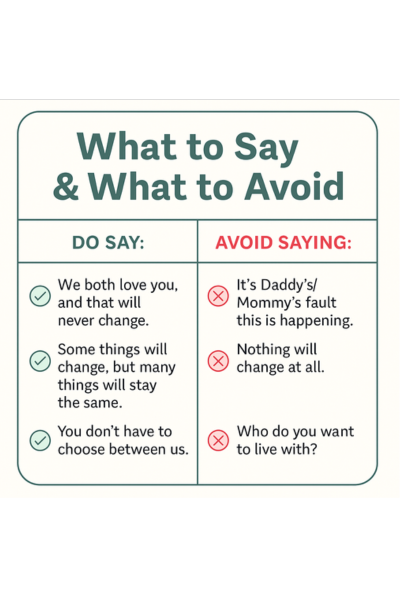Divorce is never easy, and one of the hardest parts for parents is figuring out how to tell kids about divorce in a way that protects their sense of safety and security. Children often look to their parents for stability, so hearing about a major family change can bring up fear, sadness, or confusion.
The good news is that with preparation, empathy, and clear communication, you can help your children understand what’s happening while reassuring them that they are loved and supported. Below, we’ll answer the most common questions parents ask about this delicate conversation.
How do you explain divorce to young children?
When exploring how to tell kids about divorce, it’s important to use simple, age-appropriate language.Young children- toddlers to early elementary age don’t need complex explanations—they need clarity and reassurance.
Here are some guidelines:
- Keep it simple: “Mommy and Daddy have decided not to live together anymore. We both love you very much, and that will never change.”
- Focus on stability: Let them know what won’t change (love, routines, school, friends).
- Validate emotions: Tell them it’s okay to feel sad, angry, or confused.
Example for a 5-year-old:
“Sometimes grown-ups can’t live together happily anymore. We decided it’s better for us to live in two homes. You’ll still see both of us, and we’ll both take care of you.”
What’s the best age to talk to kids about divorce?
Parents often wonder if there’s a “right” age. The truth is, the best age is the age your child is when the separation happens. Kids don’t benefit from being left in the dark.
When thinking about how to tell kids about divorce based on their age, consider these tips:
- Toddlers & preschoolers: Use short, concrete statements. They won’t understand the concept fully but will notice changes in routine.
- Elementary school kids: Provide simple explanations and encourage questions. They may feel guilty or worry it’s their fault, so reassure them directly.
- Preteens & teens: Offer more detail, respect their need for honesty, and invite them into conversation. Teens may be angry—validate their feelings without becoming defensive.
The earlier and more openly you communicate, the easier it is for your child to adjust.
| Age Group | Example Script |
|---|---|
| Toddlers & Preschoolers | “Mommy and Daddy are going to live in different houses, but we both love you very much. That will never change.” |
| School-Age Children | “Sometimes grown-ups can’t live together happily. We decided it’s better for us to live in two homes. You’ll still have the same school, friends, and routines.” |
| Teens | “We want to be honest with you. Our marriage is ending, but we are still your parents and we’ll always support you. We know this may feel frustrating, and we’re here to talk anytime.” |
Divorce is never easy, and one of the hardest parts for parents is figuring out how to tell kids about divorce in a way that protects their sense of safety and security. Children often look to their parents for stability, so hearing about a major family change can bring up fear, sadness, or confusion.
The good news is that with preparation, empathy, and clear communication, you can help your children understand what’s happening while reassuring them that they are loved and supported. Below, we’ll answer the most common questions parents ask about this delicate conversation.
How do you explain divorce to young children?
When exploring how to tell kids about divorce, it’s important to use age-appropriate language.Young children- toddlers to early elementary age don’t need complex explanations—they need clarity and reassurance.
Here are some guidelines:
- Keep it simple: “Mommy and Daddy have decided not to live together anymore. We both love you very much, and that will never change.”
- Focus on stability: Let them know what won’t change (love, routines, school, friends).
- Validate emotions: Tell them it’s okay to feel sad, angry, or confused.
Example for a 5-year-old:
“Sometimes grown-ups can’t live together happily anymore. We decided it’s better for us to live in two homes. You’ll still see both of us, and we’ll both take care of you.”
What’s the best age to talk to kids about divorce?
Parents often wonder if there’s a “right” age. The truth is, the best age is the age your child is when the separation happens. Kids don’t benefit from being left in the dark.
When thinking about how to tell kids about divorce based on their age, consider these tips:
- Toddlers & preschoolers: Use short, concrete statements. They won’t understand the concept fully but will notice changes in routine.
- Elementary school kids: Provide simple explanations and encourage questions. They may feel guilty or worry it’s their fault, so reassure them directly.
- Preteens & teens: Offer more detail, respect their need for honesty, and invite them into conversation. Teens may be angry—validate their feelings without becoming defensive.
The earlier and more openly you communicate, the easier it is for your child to adjust.
Should both parents talk to the kids together?
Yes—whenever possible. If you’re considering how to tell kids about divorce, presenting the news as a united front helps children feel secure. It shows them that while the marriage is ending, both parents are still committed to working together for their well-being.
Why it matters:
- Provides consistency in the message
- Reduces confusion or mixed stories
- Reassures kids that both parents will remain involved
If tension makes this difficult, consider meeting with a family therapist beforehand to plan the conversation. Even separated parents can agree to set aside differences for this important moment.

Can a therapist help guide this conversation?
Absolutely. If you’re unsure how to tell kids about divorce in a way that’s supportive, a therapist can help parents plan the conversation and even facilitate it if needed.
Therapists can provide:
- Scripts and role-play practice for parents before the conversation
- Age-appropriate language suggestions for toddlers, kids, and teens
- Family sessions where parents and kids talk together with professional support
- Ongoing counseling to help children process emotions and adjust over time
At Cultivate Therapy, our child, family, and co-parenting counselors specialize in helping families navigate divorce with compassion and care.
Final Thoughts: How to Tell Kids About Divorce with Compassion
Divorce is a transition, not an end to your child’s family. By planning ahead, presenting a united front, and focusing on love and stability, you can help your child feel safe—even in the midst of change.
Remember: Kids don’t need all the details, but they do need honesty, reassurance, and the opportunity to express their feelings. And you don’t have to do it alone—professional support can make all the difference.
Ready for Change? Book Now:
Submit your contact information here and you’ll be redirected to our scheduling portal to book your free consultation and connect with the therapist you connect with the most.

